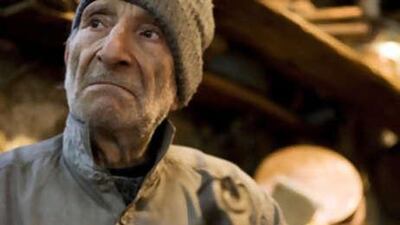The man sitting beneath the bare bulb has been making copper pots here since he was a child. He is now probably 87 years old, although he is not exactly sure when he was born. "My father was a coppersmith and so I became a coppersmith automatically," said Sa'adou al Dabagh, better known locally as Abu Gasem. "It's just what we did. I was 12 years old when I started work here. We used exactly the same methods then. I work as my father taught me to work.
"For that reason, we haven't had to change anything. We need hammers and an anvil. No machines. But an electric light is better than a candle or the gas lamps we used to have." Abu Gasem is one of a dwindling number of craftsmen left in what was once a thriving copper industry in Damascus. The covered copper market in King Faisal Street, just outside the northern walls of the Old City, used to ring with the sound of sheet metal being hammered into shape.
Now, sometimes no noise fills the gloomy, high-roofed arcade. "If you'd been here 50 years ago, you couldn't talk it was so loud," Abu Gasem said, a woolly hat pulled over his head despite the heat. "There was no space to move and there would always be people working. "In Damascus at the time there were more than 400 coppersmiths. Now, look, there are four or five of us left. I used to have 10 workers - apprentices and craftsmen. Now I'm here alone."
In Syria, copper has traditionally been the material of choice for a wide range of household goods: pots, pans, coffee jugs and home decorations. Newlywed couples used to be given copper gifts. But rising prices of raw material and the introduction of cheaper, mass-produced alternatives have pushed copper out of the mainstream. Rather than every Syrian home having at least one handmade copper pot or pan, it is now something few people bother with.
"We don't really have customers any more," Abu Gasem said. "We have some of the older families who come, or the Bedouin from outside of the cities because they are still keeping with traditions." "But you cannot blame anyone for not buying copper. It used to cost one Syrian pound per kilo, now it's 400 SYP [Dh29]. And besides, other metals really make better pots, they're just not as pretty." Born in 1920 - he is unsure which month - Abu Gasem had completed a decade-long apprenticeship at his father's side by the time he was 22.
It was only after 10 years of working with copper that he felt he had truly mastered the necessary techniques. He has made but one trip outside of Syria, travelling to Egypt and Jerusalem in the early 1960s. In contrast, his children have all left the country to live and work in the United States. "Sons should follow their fathers into business, but mine didn't and I'm glad about that," Abu Gasem said, predicting that eventually his trade would die out entirely.
"Times are tough and I just about make enough money to cover my expenses," he said. "I'm too old to worry about my own future - there comes a time when you have nothing to fear - but I can't see any hope for the other coppersmiths, there's no future in the profession." That future may be further imperilled because of controversial on-again-off-again plans by Damascus city authorities to remodel King Faisal Street. It runs past the Ruqqayah shrine, which annually attracts tens of thousands of Shiite pilgrims, largely from Iran.
It has become a traffic choke point and, with buildings in the area becoming increasingly dilapidated, there are pressures to demolish the zone. If that happens, the copper market would cease to exist. Dressed in a dirty grey work shirt, and with a leather belt pulled high and tight above his hips, Abu Gasem shrugged off suggestions that he consider retirement. "I suppose really I'm just here out of habit," he said. "My hand needs to hold a hammer and needs to hit copper.
"Besides, I've never worked in a government job so I will not get a pension. I need to earn money to pay my taxes. "When I'm dead, they'll still want me to pay taxes." Still in good health, Abu Gasem said that life in Damascus has improved over the years, regardless of his industry reaching the brink of extinction. "Things are much better than they used to be," he said. "People are much more educated than they used to be and because of television they know what is going on in the world.
"Syrians seem to be more religious than they used to be, which is also a good thing. "I see more youngsters going to the mosque than I used to. But they are more complicated than they used to be, and life is more complicated. It used to be so much simpler."
psands@thenational.ae

Copper: A dying craft
When this man was learning his trade, he was one of hundreds of coppersmiths. Today, there are only a handful.
Most popular today
